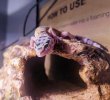Hello everyone! I just joined this forum in hopes to get some advice from people I am hoping have a good amount of knowledge concerning leopard gecko husbandry and care.
I have had a leopard gecko in the past and when i did I had researched the heck out of it, had the set up perfect at least that's what I thought. I recently got a leo again and as I have been double checking my care facts, I am finding conflicting information to what I knew to be the way to keep leopard geckos.. and now I am questioning if I am rusty or wise.
I joined a leo group on face book asking for help with the same subject but thier advice isn't sticking right with me so I wanted to get a second opinion.
First and foremost, are UTHs bad and dangerous for leopard geckos? Because I was told they needed belly heat to digest food. But this group I am in says UTHs are a no go, and that you have to use a heat bulb.
I use a ceramic bulb to help keep the temps right in the tank, but also an UTH on the warm side. So am I crazy? Are UTHs outdated?
Also, I was hoping to get some info on substrate. Back when I owned my last leo I was told no loose substrate, absolutely no sand due to growing bacteria and impaction risk, no repticarpet. That you used paper towels for cheap easy, and high quality peal and stick tiles for the bottom.. now I understand they are saying the peal and stick are bad due to fumes. But now they say no hard substrates, that they need a mix of dirt and sand. Or the bio substrates.
I was looking into the Excavator clay and joshes frogs bio desert bedding.
Thoughts?
I have had a leopard gecko in the past and when i did I had researched the heck out of it, had the set up perfect at least that's what I thought. I recently got a leo again and as I have been double checking my care facts, I am finding conflicting information to what I knew to be the way to keep leopard geckos.. and now I am questioning if I am rusty or wise.
I joined a leo group on face book asking for help with the same subject but thier advice isn't sticking right with me so I wanted to get a second opinion.
First and foremost, are UTHs bad and dangerous for leopard geckos? Because I was told they needed belly heat to digest food. But this group I am in says UTHs are a no go, and that you have to use a heat bulb.
I use a ceramic bulb to help keep the temps right in the tank, but also an UTH on the warm side. So am I crazy? Are UTHs outdated?
Also, I was hoping to get some info on substrate. Back when I owned my last leo I was told no loose substrate, absolutely no sand due to growing bacteria and impaction risk, no repticarpet. That you used paper towels for cheap easy, and high quality peal and stick tiles for the bottom.. now I understand they are saying the peal and stick are bad due to fumes. But now they say no hard substrates, that they need a mix of dirt and sand. Or the bio substrates.
I was looking into the Excavator clay and joshes frogs bio desert bedding.
Thoughts?
Attachments
Last edited:

